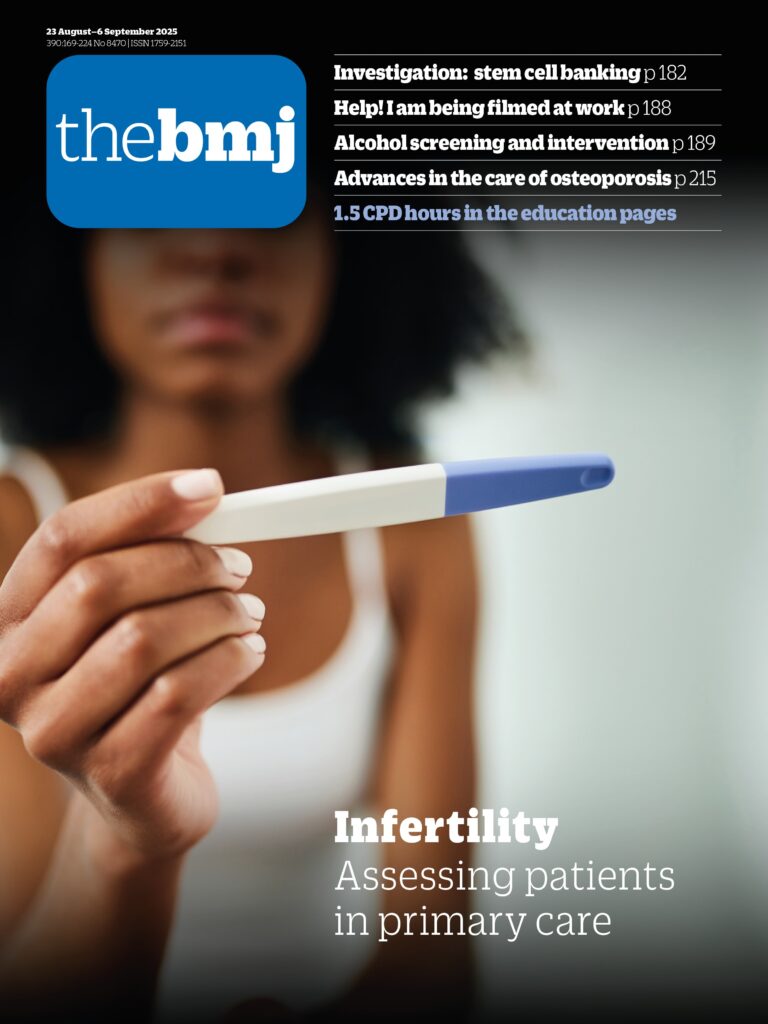1Centre for Academic Primary Care, Department of Population Health Sciences, Bristol Medical School, University of Bristol, Bristol, UK
2Violence and Society Centre, University of London, London, UK
- gene.feder{at}bristol.ac.uk
The Terminally Ill Adults (End of Life) Bill is approaching its second reading in the UK House of Lords. If passed, it will allow people who are terminally ill and expected to die within six months to request assistance to end their lives.1 We believe that the safeguards in the bill need to be strengthened to prevent coercion in the context of domestic abuse.
Despite requests for assistance in dying being subject to an assessment of capacity by two doctors and a final decision by a multidisciplinary panel, the bill raises, but does not fully tackle, specific safeguarding concerns for patients experiencing domestic abuse. Domestic abuse includes economic, emotional, physical, and other forms of abuse from a partner or other family member.2 People living with a life limiting illness are at increased risk of domestic abuse because they are more likely to be frail, isolated, and dependent on others.34
One in four women and one in seven men in England and Wales have experienced domestic abuse.5 Coercive and controlling behaviours are core to domestic abuse. They result in loss of autonomy and independence and are intended to isolate and reduce self-worth.6 Such behaviours are common but hard for health professionals to detect. Abuse compromises physical safety and can lead to depression, anxiety,7 and suicidality.8 Suicide is the leading cause of death associated with domestic abuse, exceeding the number of people killed by their partner.9
Domestic abuse of people with a life limiting illness may include coercion to sign do not resuscitate orders and pressure to decline treatment.3 Eroded self-worth means those affected can feel like a burden, especially if they have a disability or are older or reliant on a partner or family member for care.310 Women may be particularly vulnerable to the perception that they are a burden.11 Some people experiencing abuse face additional language and socioeconomic barriers to receiving support.
In jurisdictions where assisted dying is already established in law—such as Australia, Canada, the Netherlands, and Oregon in the US—there is concern about coercion in assisted dying. None of the authorities in these regions have sufficient safeguards in place to prevent coercion in assisted dying decisions, however.
To safeguard against domestic abuse and associated coercion, we propose a set of principles that should be part of the UK bill.
Firstly, for doctors responding to any request for assisted dying, training must be extensive, specialist, in person, and backed up by referral pathways.1213 Independent domestic abuse advocates, with expertise in recognising coercive control, could contribute to assessment of assisted dying requests. Advocates would be well placed, given that they support patients through domestic abuse referral pathways from general practice to specialist advocacy. Our recommendation goes beyond the abstract requirement for “specialist training in coercion” articulated in the bill, by specifying involvement of domestic abuse advocates in training and supporting doctors assessing requests.
Secondly, commitments to confidentiality and data security must not obscure assisted dying decisions and the contexts in which they occur. The bill must ensure transparency with a requirement, as in the Netherlands,14 that every case of assisted dying is assessed after the death in relation to the approval criteria. Greater transparency and more open discourse about the approval process would deter coercion and inform doctors and advocates on how to approach cases where coercion is suspected.
Thirdly, the bill must establish accountability. Transparent data about each stage of the approval process would also enable monitoring and regular scrutiny of the processes and outcomes of assisted dying legislation. In cases where health and other professionals have been non-compliant, procedures for further (potentially criminal) investigation should be identified.
Finally, lawmakers must resist expansion. In Canada, extension of assisted dying beyond terminal illnesses to people with disabilities was swift. Dementia and mental health conditions are now being considered for eligibility.15 These are conditions prevalent in survivors of domestic abuse.5 The UK bill should include clauses that limit any expansion of scope to other conditions and situations.
Assisted dying requires a careful consideration of the risks posed by domestic abuse and coercion. This is reflected in clause 34 of the UK bill, creating new offences relating to any person inducing another, through dishonesty, coercion, or pressure, to request assisted dying or self-administer a substance. As the bill progresses, parliament must build in robust safeguards ensuring expert advocacy, transparency, and accountability. Regulation of assisted dying requires a balance between safety and access, yet discussions of safety do not always highlight the risk of coercion.16 Legislation should be informed by lived and international experience, including disability rights groups, groups representing older people, and an understanding of coercive control and domestic abuse, reinforcing individual dignity and autonomy.
Acknowledgments
GF, EC, and SM are funded as part of the UK Research and Innovation consortium Violence, Health, and Society (VISION, Grant MR/V049879/1).
Footnotes
-
Competing interests: None.
-
Not commissioned, not externally peer reviewed.

